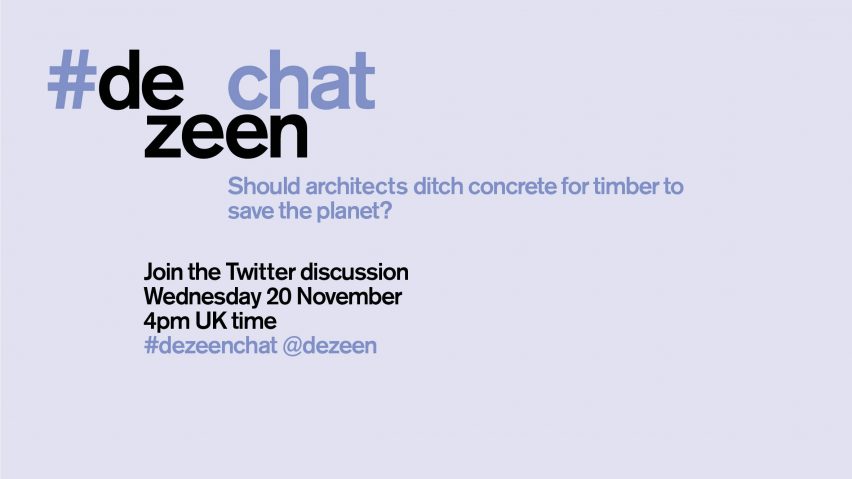Should architects ditch concrete for timber to save the planet? Dezeen's India Block and Lizzie Crook will be taking to Twitter on Wednesday 20 November at 4pm UK time to discuss whether timber is a better alternative to concrete. Join in using the hashtag #dezeenchat.
Concerns over sustainability have led to debate over architects' responsibilities to stop using concrete, and timber has been suggested as a viable alternative. But, as Dezeen readers have pointed out, there are many factors that need to be taken into account.
Experts and activists at the Architecture of Emergency climate summit in September called upon architects to fight climate change by ditching concrete completely.
"If you came here with the hope of one clear action for what you can do in the office tomorrow – stop it with the concrete," said Maria Smith, founder of architecture studio Interrobang, in her keynote speech.
"If we invented concrete today, nobody would think it was a good idea," said Michael Ramage, an architectural engineer and University of Cambridge academic, who suggested at the summit that using timber is more environmentally responsible.
However, many commenters on Dezeen contested this view. Some argued that timber buildings are actually less sustainable because they don't last as long as concrete.
Richard Foo described timber structures as "buildings that deteriorate in time and break down back to nature," adding "this goes against the idea of building something that is meant to last". Michael Salatino agreed, stating: "it’s ludicrous to ignore its [concrete's] economic durability".
Others pointed out that timber buildings could also be environmentally damaging due to the chemicals used to treat the material. "Wood needs treatments (use of heat that emits CO2) and frequent poison to avoid termites," said reader.
However, Jay C. White Cloud welcomed the discussion on moving away from concrete: "It's a choice, usually rooted in ignorance of the alternative modalities, or pure greed and laziness that allowed it [concrete] to grow into such a popular building material".
Dutch architect Marco Vermeulen also expressed his support for using timber over concrete during a Dezeen-hosted talk at Dutch Design Week last month. He calculated that the Netherlands' vast woodlands could provide enough timber for 22,000 houses each year, locking up 45 megatons of carbon dioxide over 45 years and solving the country's shortfall of homes.
Vermeulen's maths came under scrutiny in the comment section, with one commenter stating "The proposed wood production can not supply enough homes for one multipopulated country! The proposal is nonsense."
Jay C. White Cloud disagreed, suggesting that timber's success is dependant on the methods of production: "timber structures would not have any issue at all (as you suggest) in supplying enough homes for multi-populated regions if properly designed and facilitated".
Jacopo felt the debate was oversimplifying the problem. "We have a very complicated problem which is the result of multiple variables and millions of factors, and we want to find 'ONE' solution to rule them all," he stated, asking: "Why are we always so arrogant?"
Matthew Bentley similarly expressed concerns over the scalability of the proposed solution. "Is this a model that could be implemented globally?" he asked. "In countries that don't have the forest reserves that the Netherlands have, is there another material that could be used in its place?"
What do you think? Does the durability of concrete buildings outweigh the initial environmental impact that comes from using the material? Could timber solve the global housing crisis? Is there another solution that the debate has so far overlooked?
Join the debate using the hashtag #dezeenchat on Wednesday 20 November 4pm UK time.
How it works
Log into Twitter at 4pm on Wednesday 20 November and search for #dezeenchat. Use this hashtag in all your tweets so everyone following the chat can see what you're saying.
Not able to make it? Share your thoughts using the comments below and we'll tweet on your behalf during the chat.

